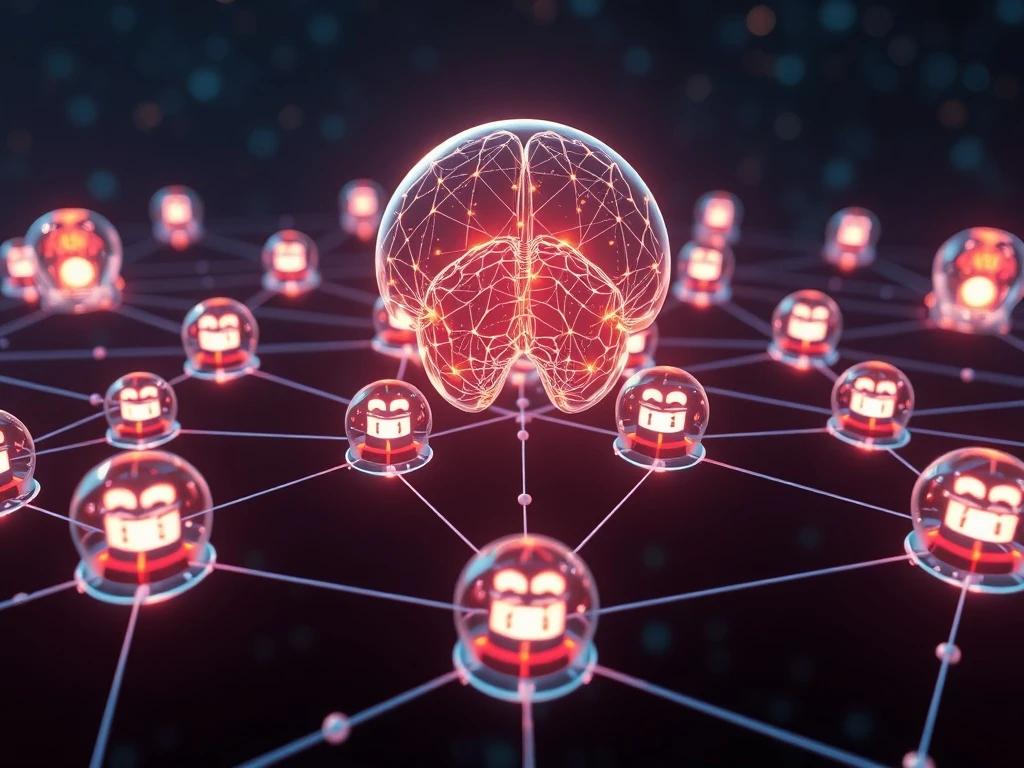Privacy-First AI: How Oraichain, Pinlink, and RSS3 Revolutionize Secure Intelligence

The rapid advancement of artificial intelligence has undeniably reshaped our world, integrating deeply into almost every digital facet of our lives. From personalized recommendations to complex medical diagnostics, AI’s potential seems limitless. However, this pervasive integration has also brought a critical conversation to the forefront: the intensifying concerns around data privacy. As AI systems become more sophisticated and data-hungry, traditional centralized models often leave users vulnerable, their personal information exploited without true consent or transparency. This is where the concept of Privacy-First AI emerges as a beacon of hope, and three groundbreaking blockchain-based platforms—Oraichain, Pinlink, and RSS3—are leading this transformative charge.
The Urgent Need for Privacy-First AI in a Data-Driven World
For too long, the digital landscape has been dominated by a “data is the new oil” mentality, where personal information is harvested, processed, and monetized by centralized entities with little oversight. This model, while fueling rapid AI development, has led to a litany of issues:
- Data Breaches: Centralized databases are prime targets for cyberattacks, leading to massive leaks of sensitive user data.
- Opaque Algorithms: Users often have no idea how their data is being used, processed, or even stored within proprietary AI models.
- Surveillance Capitalism: The business model thrives on extensive data collection and analysis, often eroding personal autonomy.
- Lack of Control: Individuals have minimal say over who accesses their data, for what purpose, or how long it is retained.
The push for Privacy-First AI is a direct response to these systemic flaws. It advocates for a paradigm shift where privacy is not an afterthought but a fundamental design principle, empowering users with control and transparency over their digital footprint. Web3 principles—decentralization, user ownership, and transparency—provide the ideal foundation for building such an ethical AI ecosystem.
Oraichain: Pioneering Verifiable AI Processing for Trust
Imagine an AI system where you can actually verify how your data is handled, even without seeing the raw data itself. This is the groundbreaking promise of Oraichain. At its core, Oraichain introduces a framework for verifiable AI processing, leveraging advanced cryptographic tools like zero-knowledge proofs (ZKPs). While it doesn’t inherently anonymize your data in every scenario, it ensures that you can audit and confirm that AI models are adhering to privacy-preserving rules.
Here’s how Oraichain fosters unparalleled trust:
- Cryptographic Verification: Using ZKPs, Oraichain allows AI models to prove that a computation was performed correctly and in compliance with specific rules, without revealing the underlying data.
- Auditable AI Models: Users can verify that a model trained on their sensitive information does not retain identifiable details or that it only uses data for its stated purpose. This eliminates the black-box problem common in traditional AI.
- Transparency Without Exposure: It enables a new level of transparency where data usage can be confirmed without compromising the utility of AI outputs or exposing sensitive information.
This verifiable logic contrasts sharply with the opaque corporate systems we’ve grown accustomed to, where data usage remains hidden behind proprietary algorithms and terms of service agreements that few truly understand.
Pinlink: Decentralized Execution for Ultimate Confidentiality
What if you could run highly sensitive AI tasks without ever exposing your raw data to anyone, not even the cloud provider? Pinlink makes this a reality through its innovative decentralized execution model. Pinlink addresses privacy by allowing users to access secure, encrypted computation environments, ensuring that data remains confidential throughout the AI processing lifecycle.
Key aspects of Pinlink’s approach include:
- Compute-to-Data Model: Instead of sending data to the computation, Pinlink brings the computation to the data. Raw data remains encrypted and never leaves the user’s control or a secure enclave.
- Trusted Compute Resources: The platform sources trusted compute resources from its decentralized marketplace, allowing users to run sensitive tasks, such as AI training or inference, within isolated, secure enclaves.
- Minimized Data Exposure: This approach drastically minimizes data exposure to third parties, including cloud providers, ensuring maximum confidentiality even during complex AI operations.
Pinlink’s emphasis on secure, decentralized execution aligns perfectly with the growing demand for AI tools that prioritize data minimization and protection while maintaining high performance, crucial for enterprise and individual privacy alike.
RSS3: Empowering User Autonomy with an Open Information Layer
Imagine having granular control over your entire digital footprint, deciding precisely what information to share, with whom, and for how long. This vision is brought to life by RSS3 and its Open Information Layer. RSS3 shifts the power dynamic from platforms to individuals, placing autonomy and privacy at the core of digital interactions.
How RSS3 redefines user control:
- Curated Data Feeds: Individuals can curate their own digital information feeds, encompassing everything from social media activity to personal preferences and browsing habits.
- Selective Access Granting: Users can selectively grant access to specific applications or AI services, providing only the necessary data for a particular function. For example, you might share anonymized behavioral data with an AI service to improve recommendations, while retaining full visibility and control over what is shared and with whom.
- User Consent as Default: By shifting the default from data exploitation to explicit user consent, RSS3 fundamentally redefines the relationship between individuals and AI, ensuring that personal data is always shared on the user’s terms.
This platform empowers users to be active participants in the data economy, rather than passive data points, fostering a more equitable and privacy-respecting digital environment.
The Synergy of Blockchain AI Platforms: Building a New Digital Frontier
Individually, Oraichain, Pinlink, and RSS3 offer compelling solutions to critical privacy challenges in the AI space. But their true power emerges when viewed as foundational components of a broader Blockchain AI ecosystem. Together, they form a robust infrastructure for developing and deploying AI systems that are inherently privacy-first and user-centric.
Consider their collective impact:
| Platform | Primary Privacy Focus | Key Mechanism | Benefit to AI |
|---|---|---|---|
| Oraichain | Verifiable Processing | Zero-Knowledge Proofs | Ensures transparent & compliant AI models |
| Pinlink | Confidential Execution | Decentralized Enclaves, Compute-to-Data | Protects raw data during AI training/inference |
| RSS3 | User Autonomy & Control | Open Information Layer | Empowers users to manage their digital identity for AI |
This integration into a Web3 ecosystem enables AI’s transformative potential without eroding personal privacy, directly addressing systemic challenges such as data breaches and surveillance capitalism. It’s a blueprint for ethical AI adoption, where innovation and individual rights coexist harmoniously.
Navigating the Road Ahead: Challenges and Opportunities for Decentralized AI
While the promise of decentralized, Blockchain AI is immense, the path forward is not without its hurdles. Implementing and scaling these cutting-edge solutions presents unique challenges:
- Technical Complexity: Building and maintaining decentralized networks, especially those incorporating advanced cryptography like ZKPs and secure enclaves, is technically demanding. Ensuring scalability and high performance comparable to centralized systems remains an ongoing development challenge.
- User Education: For mass adoption, users need to understand how to manage cryptographic tools, digital identities, and decentralized applications. This requires significant educational efforts to bridge the knowledge gap.
- Interoperability: Ensuring seamless communication and data exchange between different blockchain platforms and traditional systems is crucial for a cohesive ecosystem.
- Regulatory Clarity: The evolving regulatory landscape for blockchain and AI can present uncertainties for development and deployment.
Despite these challenges, the opportunities presented by these platforms are far greater. They offer a pathway to restore trust in digital systems, foster innovation in sensitive sectors like healthcare and finance, and ultimately create a more equitable and privacy-respecting internet.
A New Era of Secure Intelligence
The convergence of blockchain technology and artificial intelligence, championed by platforms like Oraichain, Pinlink, and RSS3, marks a pivotal moment in the digital age. They are not merely offering incremental improvements but are fundamentally redefining how we interact with and trust AI systems. By prioritizing privacy, empowering user autonomy, and leveraging decentralized principles, these platforms are laying the groundwork for a future where AI’s transformative power can be harnessed without compromising our most fundamental rights. As trust in centralized systems continues to erode, the innovative models presented by Oraichain, Pinlink, and RSS3 demonstrate that privacy and AI innovation are not mutually exclusive but powerful, complementary forces driving us towards a more secure and ethical digital frontier.
Frequently Asked Questions (FAQs)
What is Privacy-First AI?
Privacy-First AI is an approach to artificial intelligence development that prioritizes user data privacy and autonomy from the design phase. Instead of treating privacy as an add-on, it integrates mechanisms like decentralization, encryption, and verifiable computation to ensure data is protected, controlled by the user, and used transparently.
How do Oraichain, Pinlink, and RSS3 differ in their approach to AI privacy?
Oraichain focuses on verifiable AI processing using zero-knowledge proofs, allowing users to audit how their data is handled without revealing the data itself. Pinlink emphasizes decentralized execution through secure enclaves and a “compute-to-data” model, ensuring raw data remains encrypted and never exposed to third parties. RSS3 provides an Open Information Layer, empowering users with granular control over their digital information feeds, enabling selective data sharing based on explicit consent.
What are zero-knowledge proofs (ZKPs) and how does Oraichain use them?
Zero-knowledge proofs (ZKPs) are cryptographic methods that allow one party (the prover) to prove to another party (the verifier) that a statement is true, without revealing any information beyond the validity of the statement itself. Oraichain uses ZKPs to enable verifiable AI, meaning an AI model can prove it processed data according to privacy rules (e.g., not retaining identifiable information) without exposing the original sensitive data.
What does “compute-to-data” mean in the context of Pinlink?
“Compute-to-data” is a privacy-preserving paradigm where, instead of moving sensitive data to a centralized computing environment, the computation (e.g., an AI model) is brought to where the data resides. Pinlink implements this by allowing users to run AI tasks within secure, encrypted enclaves where the raw data remains protected, ensuring it is never exposed to external parties or even the cloud provider.
How does RSS3 empower users with control over their digital information?
RSS3 provides an Open Information Layer that allows individuals to curate and manage their own digital data feeds. Users can selectively grant and revoke access to their information for various applications and AI services. This shifts the control from platforms to individuals, ensuring that personal data is shared only with explicit consent and for defined purposes, giving users true autonomy over their digital identity.










